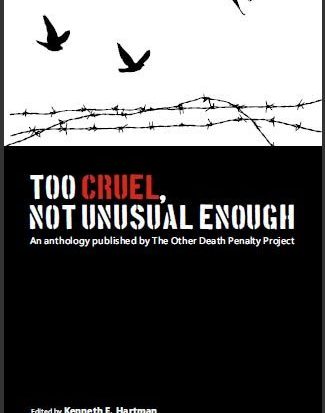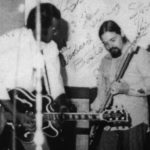

By Boston Woodard
(Editor’s note: Woodard remains in administrative segregation (“The Hole”) in San Quentin. However, he is doing fine and plans to share his experience with us in the near future. He thanks everyone for their concern.)
Life without the possibility of parole (LWOP) is the “ultimate anti-human prison sentence” according to Kenneth Hartman, an LWOP lifer and award-winning author of Mother California: A Story of Redemption Behind Bars.
Hartman, founder and executive director of The Other Death Penalty Project, campaigns to end all forms of death penalty, including life without the possibility of parole.
Too Cruel, Not Unusual Enough is a newly released anthology that incontestably illuminates the aberration and anguish of this impasse of a prison sentence. It is a collection of powerful testimony from men and women serving LWOP from around the country.
 The selections of poetry, prose and essays comprising this anthology were drawn from a nationwide contest sponsored by The Other Death Penalty Project and were read by award-winning author and prison reform activist Luis J. Rodriguez.
The selections of poetry, prose and essays comprising this anthology were drawn from a nationwide contest sponsored by The Other Death Penalty Project and were read by award-winning author and prison reform activist Luis J. Rodriguez.
“Life without the possibility of parole is life without the possibility of life,” said Rodriguez. “It’s capital punishment on the installment plan. It’s without the possibility of redemption, initiation or restoration.”
Judith Tannenbaum, co-author of By Heart: Poetry, Prison, and Two Lives (a two-person memoir with LWOP prisoner Spoon Jackson), was asked at a bookstore reading about how Spoon handles hope; her response, “If we citizens are going to put people behind bars for life without the possibility of parole, I think we’re obligated at least to wonder about what hope means in that context.”
Most of the world has abolished the death penalty as cruel and unusual punishment. In some ways, “LWOP, life without parole, is more cruel,” said David Scott Milton, novelist, playwright and screenwriter.
“Death, after all, is a cessation of pain. LWOP, these men tell us, is pain without end. No civilized society, however, deserves to exact pain without end from its criminals,” said Milton.
“I agree that state-sanctioned execution is morally repugnant,” said Hartman. “I do not agree that a life devoid of any possibility of restoration is a reasonable or humane alternative. It simply is not.”
Too Cruel acquaints readers with the fact that a death penalty by any other name is as cruel, as violent and as wrong.
“Life without the possibility of parole is barbaric beyond definition,” explains Wayne Kramer, activist, artist and co-founder of Jail Guitar Doors USA. “As someone who has served a prison sentence, this degree of punishment is unimaginable,” said Kramer.
The Other Death Penalty Project says that the only way to change the reality of more than 40,000 prisoners sentenced to die slowly in prison is to mobilize “all our resources, all our talents, and all of our connections to others and speak out in a loud and clear voice: stop sentencing people to death by imprisonment.”
To learn more about the other death penalty, visit www.theotherdeathpenalty.org. It’s time for the whole truth to be told and confronted.
*****
Boston Woodard is a prisoner/journalist. He writes for the Community Alliance and has written for and/or edited several prison publications. He is the author of Inside the Broken California Prison System, which is available at www.amazon.com. Learn more at www.brokencaliforniaprison.com. Contact him at Boston Woodard, B-88207, C-Section, 1-C-38, S.Q.S.P., San Quentin, CA 94974.
